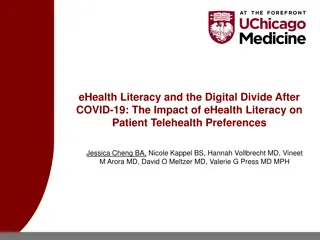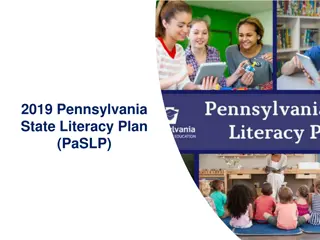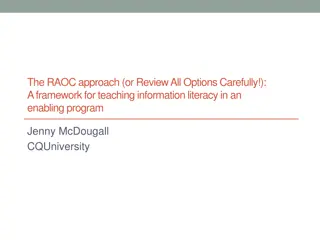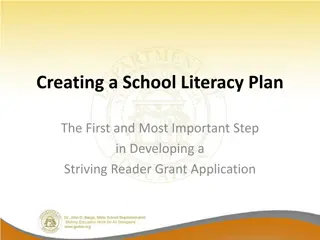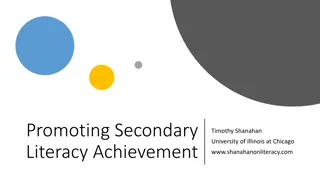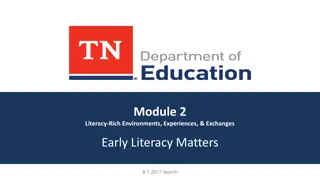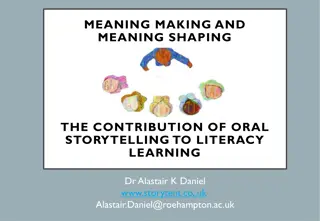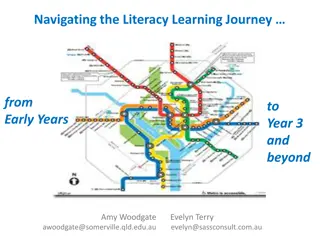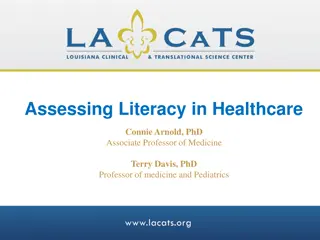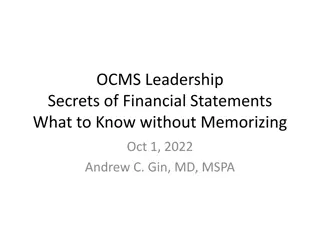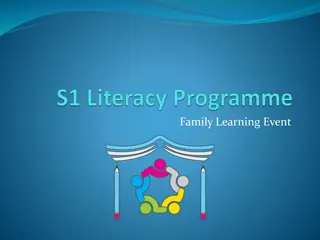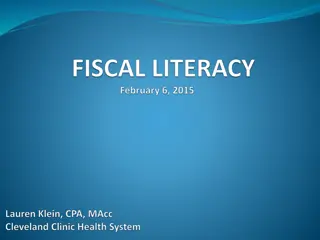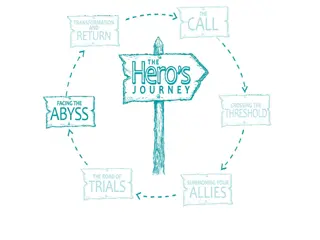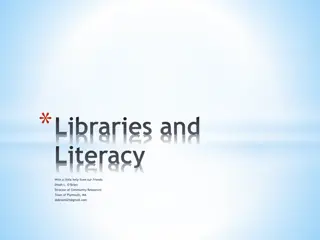Financial Literacy and Its Importance
Financial literacy is crucial in today's society as it involves knowledge of financial concepts, skills to make effective decisions, and confidence in financial matters. This module explores the definition of financial literacy, its importance for young people, and the impact of financial literacy and illiteracy on personal and professional life. It delves into fundamental terms, such as budgeting, savings, debts, investments, credits, retirement, and taxes. Through case studies like Anne's, the module demonstrates the real-world application of financial literacy in managing income and expenses effectively.
Download Presentation

Please find below an Image/Link to download the presentation.
The content on the website is provided AS IS for your information and personal use only. It may not be sold, licensed, or shared on other websites without obtaining consent from the author.If you encounter any issues during the download, it is possible that the publisher has removed the file from their server.
You are allowed to download the files provided on this website for personal or commercial use, subject to the condition that they are used lawfully. All files are the property of their respective owners.
The content on the website is provided AS IS for your information and personal use only. It may not be sold, licensed, or shared on other websites without obtaining consent from the author.
E N D
Presentation Transcript
Module 1. Being financially literate What it means and what it takes!
Learning outcomes of this Module: a) Understanding what financial literacy is b) Benefits of Financial literacy c) The impact of Financial Literacy and Financial Illiteracy on personal and professional life.
Unit 1.1: Financial Literacy as a learned competence Definition of the term financial literacy Why it is an essential skill nowadays.. Why it is important competence for young people.. Unit 1.2: Fundamental terms and concepts Understanding basic financial terms and concepts that affect financial health Short definitions of budgeting, savings, debts, investments, credits, retirement, taxes Unit 1.3: The impact of financial literacy and illiteracy on personal and professional life Defining financial illiteracy How the absence of financial literacy could affect personal and professional life Benefits of financial literacy
What is Financial Literacy according to you? Why is financial literacy/education important in our daily lives?
Unit 1.1: Financial Literacy as a learned competence Definition of the term financial literacy the knowledge and understanding of financial concepts and risks, as well as the skills, motivation and confidence to apply that knowledge and understanding in order to make effective decisions across a range of financial contexts, to enhance individual and societal financial well-being and to enable participation in economic life (OECD, 2016). Why it is an essential skill nowadays.. In modern economies, the ability to reasonably deal with money and financial matters is becoming increasingly vital not only for professionals in the sector of investment and banking, but for every individual responsible for managing his or her financial affairs in everyday life. Why it is important competence for young people.. Financial literacy is widely recognised as a fundamental skill of high relevance especially to young people. In particular, young people are relatively inexperienced in using financial products and may only recently have started handling financial transactions. Young people are also very likely to face important financial decisions in the near future that are different from those faced by older adults, such as deciding how to fundadditional education or identifying work opportunities. The transition from youth to adulthoodis financially demanding, and it is easy to go wrong without the right knowledge.
Unit 1.1: Financial Literacy as a learned competence Case study: Anne started her first-time job after university and she earns 1000 Euro per month. Her monthly expenses including utilities and household bills are around 400 Euro. From the remaining 600 euro, she pays 100 Euro for her monthly gym subscription that offers numerous services, which are not entirely utilized by her. She also uses the remaining 500 Euro left over to buy luxurious items including brand name clothing and going to expensive dinners and bars. This means that at the end of the month she is left with no saving for any unforeseen liabilities, which might incur. What do you think for the way Anne is managing her finances? Does she cover all her needs now? Is she thinking for the future?
Unit 1.2: Fundamental terms and concepts Budgeting Basics Saving Basics Debt Basics Credit Basic Investing Retirement Basics Taxes
Unit 1.2: Fundamental terms and concepts Budgeting Basics A budget is a financial plan that takes income and expenses into account and provides estimates for how much one makes and spends over a given period of time. Saving Basics Throughout his/her life, one will be faced with many decisions about saving and spending. One s goals can vary from smaller purchases such as a new smartphone to larger purchases, such as a car or a house to long-term savings for retirement. One shall be prepared for any type of expense by having money set aside. Debt Basics It is important to recognize that there are two various types of debts and they will not always result in the same outcome. Going into debt for school or business purposes or taking out a loan for real estate (such as a mortgage) could be considered investments that might yield greater financial earnings in the future. This kind of debt may be costly in the short term, but could potentially end up paying for itself in the long term if it is an investment in an asset such as education or real estate. However, debt that does not invest in anything is simply a financial burden in both the short term and the long term.
Unit 1.2: Fundamental terms and concepts Credit Basic Credit cards provide security, convenience, and even rewards based on spending. However, if cardholders don t manage their cards carefully, they may find themselves facing unwanted consequences like a poor credit score or hidden fees. Investing Investing is all about creating and growing the wealth in order to enjoy a financially secure and happy future. Taxes Taxes are an indispensable part of the financial landscape that individuals have to deal with during their life. Retirement Basics It's never too soon for one to start saving for his/her retirement. To get the most out of his/her retirement savings, one will have to start planning and saving at an early age.
Unit 1.2: Fundamental terms and concepts Case Study: Let us assume that both James and Peter earn 2000 Euro every month. They have just started their first jobs, after university. James allocates his salary as follows: Spending = 1500 Euro Investing = 150 euro Emergency Fund = 200 Euro Savings Account = 150 Euro At the end of the year, James invests 1800 Euro and 1800 Euro into his savings account. Both have interest, which could bring him around 500 euro more for the current year. Peter, on the other hand, spends impulsively without any planning. He leaves the remainder in his salary account it returns very low interest. Consequentially, Peter spends money on unnecessary items and ran out of cash in no time. According to you, who is aware of the fundamental terms and concepts in Financial Literacy ?
Unit 1.2: Fundamental terms and concepts QUESTION ANSWEARS TRUE/FALSE Money that is put aside in the present for use in the future What Are savings? Money borrowed from somebody Investments in items like animals, land or gold that can be sold when cash is needed. It is a way of building assets Which is correct about emergency funds Must be kept separate from normal savings Must be combined with other normal savings Which of the following are examples of challenges to savings? Lack of a budget Impulsivespending Peer pressure
Unit 1.3: The impact of financial literacy and illiteracy on personal and professional life Could you define financial illiteracy?
Unit 1.3: The impact of financial literacy and illiteracy on personal and professional life Do you think that the financial illiteracy could affect the two side of your life personal and professional? Could you give examples of negative consequences of financial illiteracy when it comes to professional and personal life?
Unit 1.3: The impact of financial literacy and illiteracy on personal and professional life Benefits of financial literacy Being financially literate is a skill that brings an array of benefits that can improve the standard of living for young people through an increase in financial stability. Making steps to becoming financially literate is an important component of life that can ensure financial solidity, reduce anxiety, and stimulate the achievement of financial goals. Could you think of some of the Benefits of being financially literate?
Unit 1.3: The impact of financial literacy and illiteracy on personal and professional life Benefits of financial literacy Ability to make better financial decisions Effective management of money and debt Greater equipped to reach financial goals Reduction of expenses through better regulation Less financial stress and anxiety Increase in ethical decision-making when selecting insurance, loans, investments, and using a credit card Effective creation of a structured budget
Unit 1.3: The impact of financial literacy and illiteracy on personal and professional life Case Study: Marry is a high school senior who works parttime at a sporting goods store. She hopes to make enough money to attend junior college without having to get a student loan. Her brother Rick is a junior who works at a bicycle shop. He is trying to save enough money to go on a long-distance cycling trip during the summer. Rick and Merry enjoy going to restaurants and seeing movies and concerts as every young person. In order to reach their financial goals, when they need to do?
Unit 1.3: The impact of financial literacy and illiteracy on personal and professional life Case Study: Rick and Merry enjoy going to restaurants and seeing movies and concerts. However, to reach their goals, they will have to watch their spending. Although they are still in high school, the financial habits they develop now will pay off in the long run. Setting financial goals will help them avoid debt and achieve financial security in the future.
TO BE CONTINUED.. Module 2: Personal financial planning








